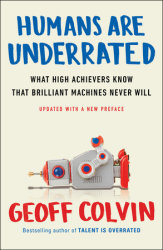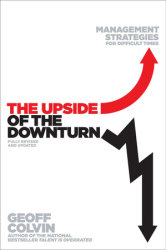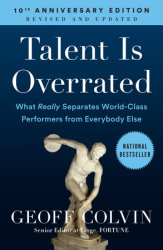In developed countries across the world, robot alarmism has been stuck on overdrive. From self-service kiosks at restaurants and hotels, to shopping assistants, to driverless cars and robotic financial advisers, the ghost of Hal 9000 stalks our every move, ready to replace our 9-to-5’s with ease and increased efficiency.
The fear that our jobs will be replaced by machines is both real and nothing new. Since the 19th century, when the original Luddites took hammers to machines that were stealing their jobs, we have struggled with the twin monsters of our own creation: automation and artificial intelligence.
But robots can be more Jekyll than Hyde (they certainly make our off-hours more entertaining) if only we recognize the unique characteristics that separate us from them. Geoff Colvin, author of Humans are Underrated, sees essential human attributes like empathy, storytelling, humor, and social acuity as keys to unlocking the value we can add to society. Below, we talked to Geoff a bit more about his latest book.
PENGUIN RANDOM HOUSE:What made you decide to write this book?
Geoff Colvin: I noticed that computers were beginning to do things that conventional wisdom held they might never do, like defeat the human champions of Jeopardy or drive a car better than people do. I also noticed that mainstream economists were beginning to question one of the oldest orthodoxies in economics, that advancing technology increases jobs and raises living standards. It seemed clear that a simple question – what will people do better than computers? – needed to be thought through.
PRH:You are optimistic about what technology’s growing presence means for humanity. Why is that?
GC: Technology has already improved our material lives beyond what anyone alive in 1800 or 1900 could have imagined, and it’s about to improve them even more dramatically. Just the benefits for our health and for the environment will be staggering. Regarding work and our ability to earn a living, technology is doing what it has always done: make some skills less valuable and others more so. The good news is that the new high-value skills are our deepest abilities of human interaction. For the first time since the dawn of the Industrial Revolution, we’re being asked to be more human, not less so, in order to succeed.
PRH:Do you believe the advance of technology will free people to be more present with their families and friends, or hinder us more – as in the way people are often “together but apart” on their phones?
GC: It will certainly free us to spend more time with family and friends.
The big question is whether we’ll actually do it. We could be doing it now – people are often astounded to find that periodically turning off the device does not ruin their careers or relationships – but most people don’t do it. Much depends on how technology evolves. If it automates many of the chores that currently require our online attention, for example, more people might feel they can afford to put down the device. I fervently hope they will.
PRH:What would you like readers to take away from Humans Are Underrated?
GC: I’d like them to understand that advancing technology is our friend, not our enemy; that we can – and must – focus our work on our deepest skills of human interaction; that we can – and must – get better at those skills; and that if we do those things, we can improve our living standards while also leading richer, more meaningful lives.














